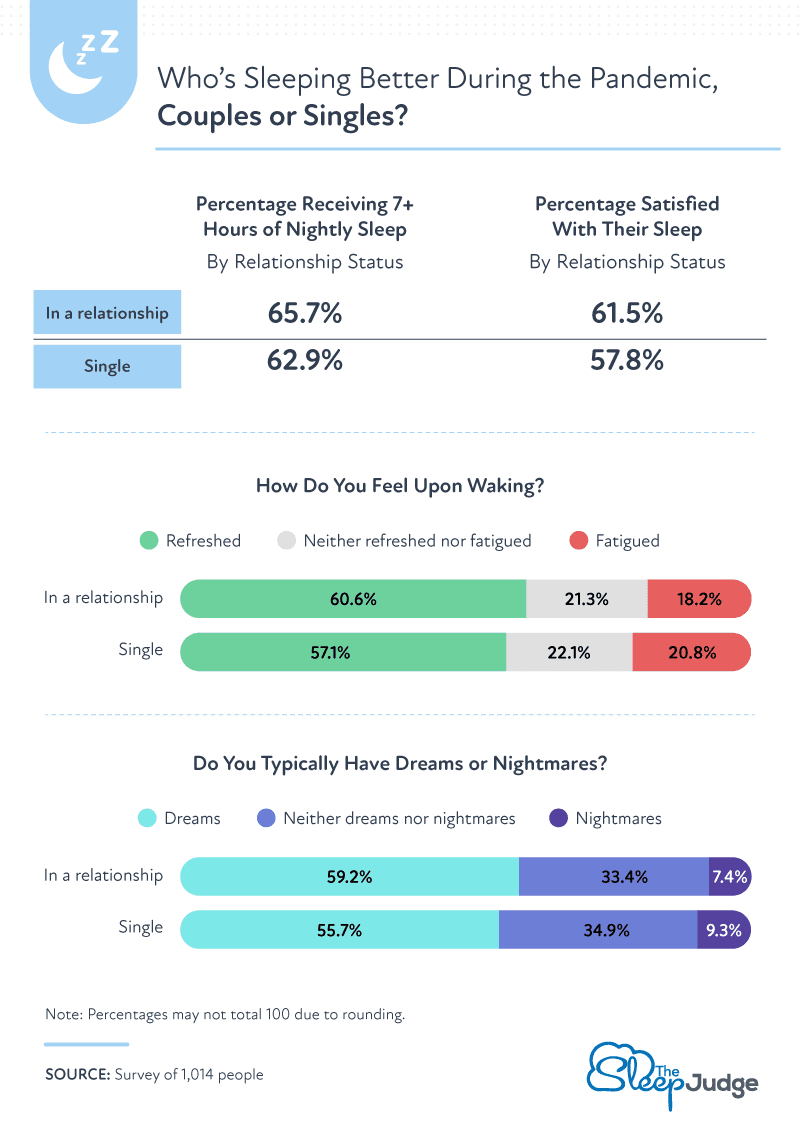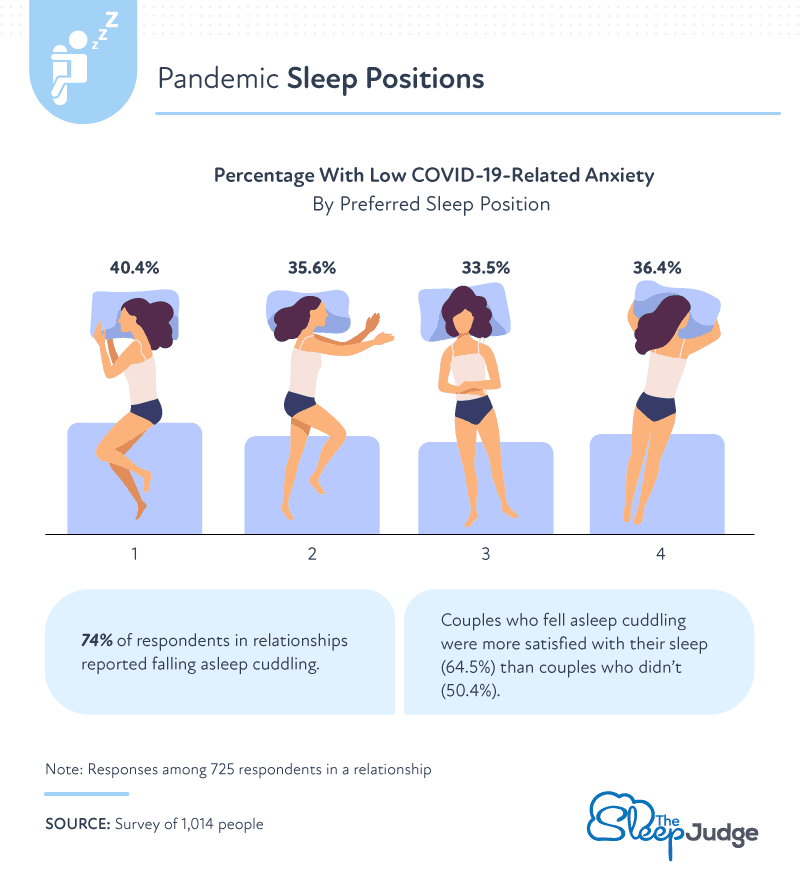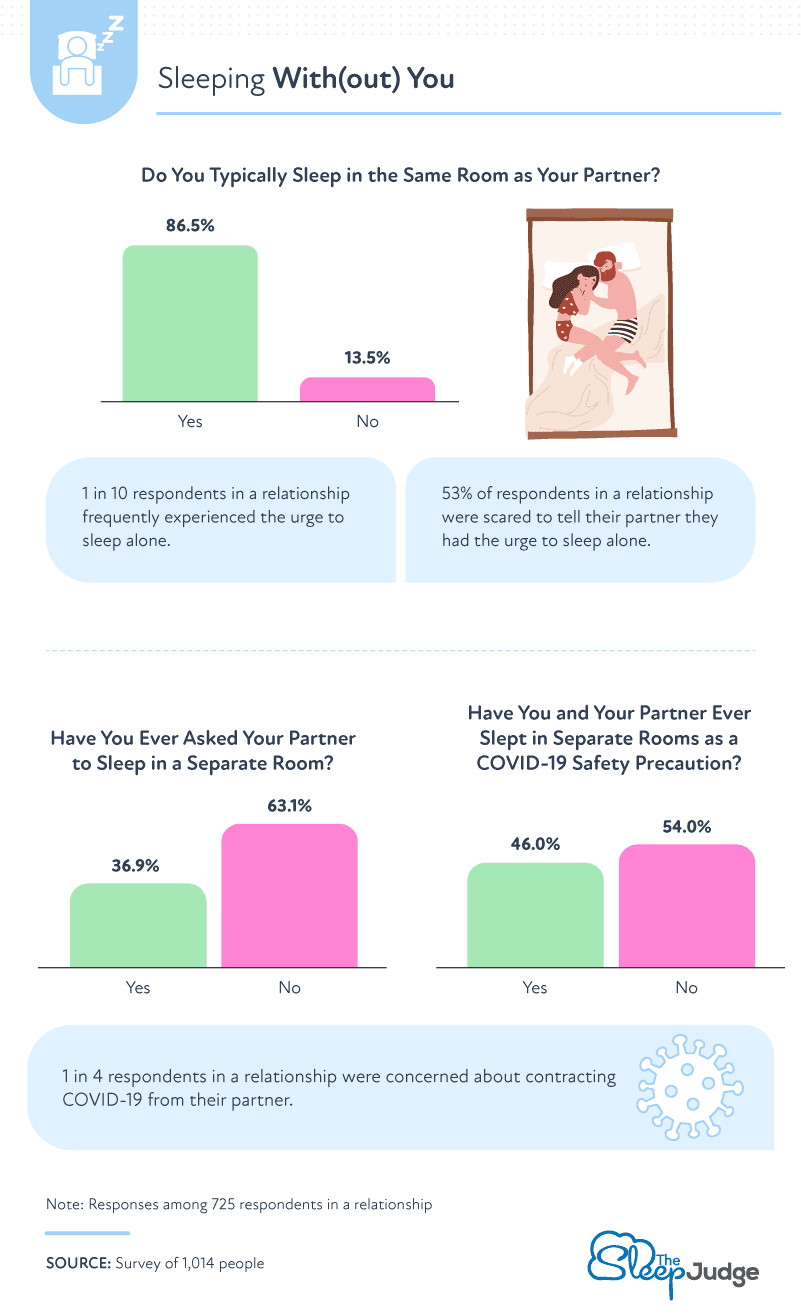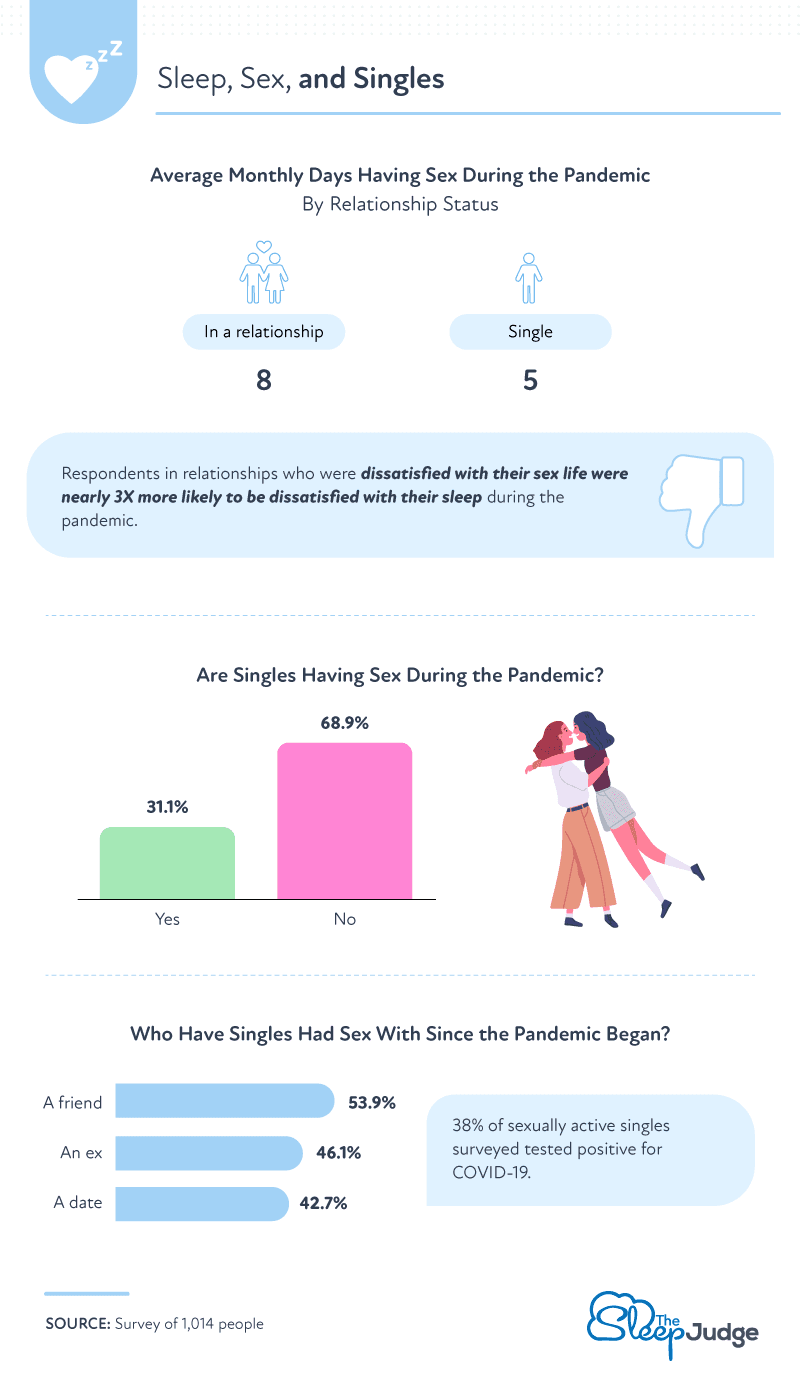Who’s Sleeping Better During the Pandemic, Couples or Singles?
The human body needs sleep to function properly, and you probably don’t need an expert to explain the connection between your rest patterns and other various mental and physical functions ranging from mood and focus to stress and wellness.
What you might not be thinking about is just how important getting a good night’s sleep is in the midst of a global health pandemic. The virus and all its impacts on daily life may be keeping you awake at night, but it’s never been more important to take your time between the sheets seriously. Not only will maintaining a proper sleep schedule help you stay regulated when so many other aspects of life feel off-kilter, but getting sufficient sleep at night will help boost your immune system and help to alleviate feelings of anxiety that could be triggered by the pandemic.
And while you might be feeling a bit tired of living in such constant proximity to your partner after months of self-quarantine and lockdown, it’s possible that people with someone to sleep next to are getting better rest than those sleeping alone.
For a closer look at how couples are sleeping during the pandemic, we surveyed over 1,000 people about how often (and in what positions) they’re getting rest. Read on to find out if couples are waking up more refreshed, which sleeping positions might be helping to reduce anxiety, how sex during the pandemic related to sleep quality, and how singles are coping with the lack of physical intimacy.
When Couples Need Space
Sleep preferences and patterns can be a deeply personalized way that our bodies find rest. Even if you’re in a long-term relationship, your partner may have different sleeping habits than you, which can occasionally lead couples to a “sleep divorce,” seeking solitude along with rest. Eighty-seven percent of people in relationships during the pandemic reported sleeping together in the same room as their partner, though 53% admitted they were scared to tell their partner they would rather sleep alone. Overall, 1 in 10 people in relationships acknowledged frequently experiencing this desire to sleep solo.
And while 1 in 4 people in relationships were worried they might contract COVID-19 from their partner or spouse, a majority wouldn’t ask their other half to sleep in a different room at night. Compared to 37% of people who requested a separate bedroom, 63% of people in relationships had never asked their partner to sleep elsewhere. Another 54% indicated they hadn’t slept apart from their partners as a COVID-19 safety precaution.
Adapting to Being Single
Being in a relationship may lead to better sleep during the pandemic, but life in lockdown with another person can be a different kind of challenge. Thirty-nine percent of people admitted to going through a breakup during the pandemic, and while 59% of singles wished they had someone to sleep with during quarantine, 62% also claimed being single during the pandemic was an easy experience.
Overwhelmingly, one of the hardest parts about being single during the pandemic might be figuring out when it’s safe to go on a date again. More than half of singles (54%) said they were waiting for a vaccine before resuming dating, and 60% of singles hadn’t been on a single date since the pandemic began. Men (41%) were only slightly more likely to go out on dates during COVID-19 than women (40%).
Getting Intimate During the Pandemic
A majority of singles might be taking a cautious perspective on their love life while waiting for the COVID-19 pandemic to pass or for a vaccine to be readily available. Still, some singles have found an opportunity to be sexually active, even with fewer dating opportunities than they might otherwise have. People in relationships reported having sex eight days a month, on average, while singles weren’t far behind with an average of five days monthly.
Thirty-one percent of single adults indicated having sex during the pandemic, including 54% who’d slept with a friend, 46% who’d sexed an ex, and 43% winding up between the sheets with someone they’d taken on a date. More than 1 in 3 sexually active singles (38%) also admitted to testing positive for COVID-19.
Better With Company
It’s often recommended that adults get between seven and nine hours of sleep every night, but what happens if you don’t quite meet that mark most nights? As it happens, getting less than seven hours of sleep each night can constitute sleep deprivation, which leads to mood swings, memory loss, cognitive decline, and a weakened immune system.
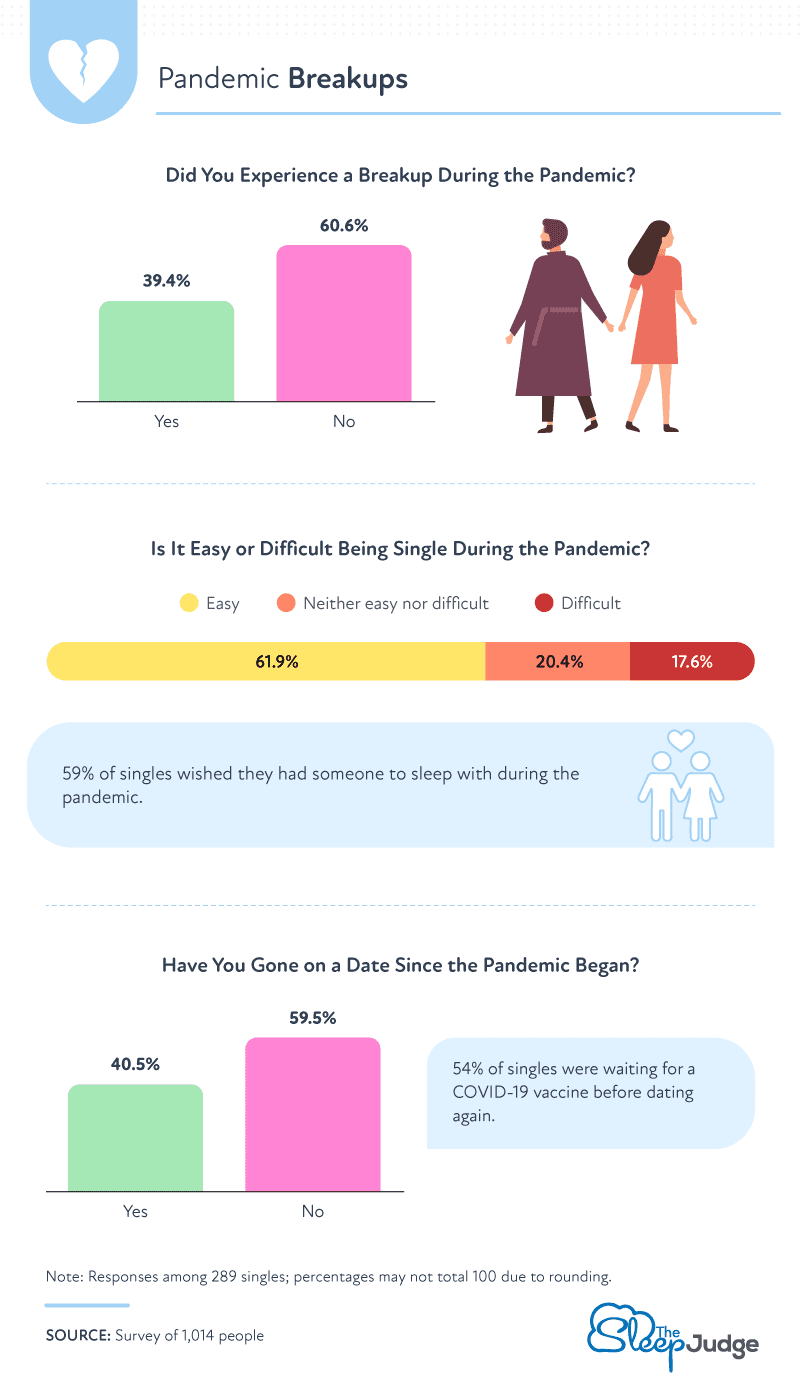
Getting Comfortable During COVID-19
Believe it or not, the position you fall asleep in at night can offer more in-depth insights into your body’s mechanics and even the aches and pains your body is subconsciously trying to alleviate. Laying on your side can say one thing, but keeping your knees bent or a pillow under your arms can indicate something else.
According to our survey, the position in which you fall asleep at night can also indicate how you’re coping with the stress or anxiety triggered by the COVID-19 pandemic. Among those with fewer feelings of anxiety related to the virus, we found the fetal sleeping position (40%) was the most popular, with knees pulled slightly into the chest. In contrast, people sleeping on their backs with their arms by their sides (34%) were the least likely to report low levels of COVID-19-related anxiety.
Getting the Best Sleep – Together, or Alone
Whether you started quarantine with someone in your love life or you were single and happy to mingle, the pandemic has presented plenty of obstacles for the way we interact with people on a daily basis. Some couples may feel overwhelmed by the amount of time they’ve shared with their significant other, and a majority of singles told us they wish they had someone to sleep with at night. While being in a relationship might not cure all of the stress or anxiety caused by COVID-19, we found people sleeping with a partner at night were more likely to get quality sleep on a consistent basis.
At The Sleep Judge, we’re passionate about helping people get a better night’s sleep, regardless of relationship status. With mattress reviews on the best beds, toppers, pillows, mattress protectors, and sofa beds, we’ll help you find the best sleeping solutions for your space and preferred sleeping positions. For couples sharing a bed at night, we’ll even help you find the best anti-snoring devices and other accessories you might need to keep the peace between the sheets. For access to our sleep resources and coupons for saving, visit us online at TheSleepJudge.com today.
Methodology and Limitations
We surveyed 1,015 people about how they are sleeping during the pandemic. Among respondents, 38% identified as female, and 62% identified as male. The ages of respondents ranged from 24 to 59. The average age of respondents was 35 with a standard deviation of nine.
For short open-ended questions, outliers were removed. To help ensure that all respondents took our survey seriously, they were required to identify and correctly answer an attention-check question.
Survey data have limitations due to self-reporting that include telescoping, exaggeration, and selective memory. We didn’t weigh this data or use statistical testing for our findings, as this was a purely exploratory look at how couples sleep during the COVID-19 pandemic.
Fair Use Statement
The grass may look greener on the other side, but for singles and people in relationships alike, COVID-19 is still full of challenges. Help share the results of this study for any noncommercial use with a link back to this page as credit to our team of creators for their work.

